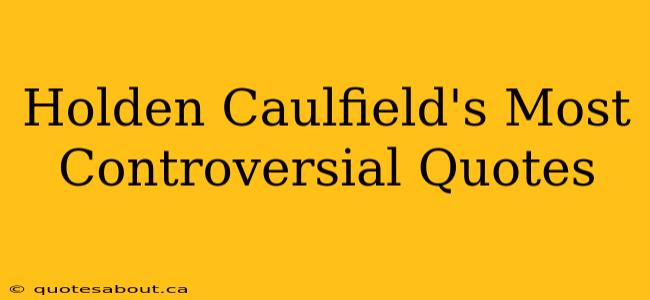Holden Caulfield, the cynical and rebellious protagonist of J.D. Salinger's The Catcher in the Rye, remains one of literature's most iconic and controversial characters. His unflinching honesty and raw emotion, expressed through a stream of consciousness narration, sparked outrage and fascination upon the novel's publication, and continue to provoke discussion today. This isn't just about teenage angst; it's about the complexities of identity, societal expectations, and the search for authenticity in a world Holden perceives as phony. Let's delve into some of his most controversial quotes and explore their enduring relevance.
What Makes Holden Caulfield's Quotes So Controversial?
Holden's controversial nature stems from his blunt, often profane, critique of the adult world and the societal norms he finds suffocating. He doesn't shy away from expressing his disgust, disillusionment, and intense emotions, challenging the reader to confront uncomfortable truths about hypocrisy and superficiality. His language, reflecting his teenage rebellion, further amplifies the controversial nature of his pronouncements. Many find his cynicism relatable, while others find it offensive or disturbing. The very fact that his words continue to spark debate underscores their power and lasting impact.
"I'm quite illiterate, but I read a lot."
This seemingly simple statement encapsulates Holden's complex relationship with education and authority. He's not necessarily unintelligent, but he rejects the formal structures of learning, preferring his own observations and experiences. This challenges traditional notions of intelligence and success, questioning whether formal education truly reflects understanding or merely conformity. His rejection of the "phony" aspects of school and society reflects a broader rebellion against institutionalized learning and the pressure to conform.
"You should see the kind of crap they sell in those stores."
This quote, and many others like it, reflects Holden's deep-seated disgust with what he sees as the commercialization and superficiality of society. He's repulsed by the materialism and lack of genuine connection he perceives in the adult world. This criticism of consumer culture resonates even more strongly today, as consumerism continues to dominate many aspects of life. This quote sparks controversy by highlighting the moral and ethical implications of unchecked commercialization and its impact on human relationships.
"Everybody's a phony."
Perhaps Holden's most famous and controversial statement, this reflects his pervasive sense of alienation and disillusionment. He sees phoniness not as a specific trait, but as a pervasive characteristic of the adult world, a fundamental flaw in the way people interact and present themselves. The controversy arises from the broad and sweeping nature of the statement; it's difficult to argue with his experiences, yet the universality of the accusation is profoundly unsettling. The enduring resonance of this statement lies in its ability to tap into the anxieties and disillusionments many people feel within various social contexts.
What are Holden Caulfield's views on women?
Holden's interactions with women are complex and often fraught with awkwardness and insecurity. He simultaneously desires intimacy and connection, yet his own emotional vulnerabilities and insecurities prevent him from forming meaningful relationships. His interactions often reveal his internal conflict between his attraction to women and his cynicism about their perceived phoniness. This ambiguity and inconsistency make his views on women a source of much critical debate. Some argue that his portrayal reflects the limitations of a teenage boy struggling with his identity, while others criticize his misogynistic tendencies.
Why is The Catcher in the Rye still banned in schools?
The book's frequent use of profanity, its exploration of teenage sexuality, and Holden's cynical worldview have led to its frequent banning in schools. Concerns about the novel's influence on impressionable young minds, particularly its potential to normalize or even encourage rebellious and destructive behavior, remain central to the ongoing debate surrounding its inclusion in educational settings. The book challenges authority, and that is inherently unsettling to some. It forces readers to confront uncomfortable truths, and the discomfort inherent in that can lead to its removal from classrooms.
Is Holden Caulfield a reliable narrator?
Holden's unreliability as a narrator is central to the novel's power. His emotional state and his tendency toward exaggeration and distortion color his perception of events and characters. This unreliability forces the reader to actively engage with the text, interpreting his words within the context of his mental and emotional state. It is precisely this ambiguity that makes his narrative so compelling and open to interpretation, fueling continuing debates about his character and motivations.
In conclusion, Holden Caulfield's enduring power lies not simply in his controversial statements, but in the questions they raise about identity, authenticity, and the challenges of navigating a complex and often confusing world. His rebellious spirit and unflinching honesty continue to resonate with readers, sparking debate and prompting reflection on the issues he so powerfully portrays. His legacy isn't just about shocking statements; it's about provoking critical thought.

